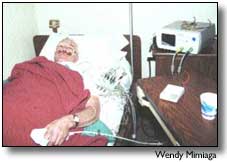|
April 7, 2001
By Jim Mimiaga Journal Staff Writer Problems sleeping? Tired all the time? If so, Southwest Memorial Hospital’s new sleep lab may be able to help. More than ever, sleep disorders are being diagnosed as a cause of many health problems, said Lou Lock, a cardiopulmonary specialist heading up the lab. "It becomes a safety issue and quality-of-life issue," Lock said. "Business has been picking up." Numerous physical and lifestyle problems can contribute to poor sleeping patterns. The old saying "sawing logs" — in reference to snoring — actually is an indicator of a serious and increasingly diagnosed physical disorder called sleep apnea. Symptoms are heavy snoring accompanied by lapses in breathing that cut off oxygen to the brain and trigger the body to wake repeatedly. The effect interrupts REM sleep, the deep dreaming stage required for a restful night. Severe cases can cause heart damage, heart attacks, depression and accidents. More serious cases require surgery to correct. "Patients with sleep apnea may sleep through the night, but they are not reaching the critical REM stage because of the lack of oxygen," Lock said. The consequences, if the disorder is left untreated, may be excessive tiredness at work, lack of concentration, increased stress, or drowsiness while driving. But now sufferers can obtain the latest treatment at Southwest Memorial in Cortez. "These problems have always been out there, but now we know a lot more about what causes them, and the technology is there to help treat them effectively," Lock said. Patients who check into the sleep lab Saturday nights are monitored throughout the night in one of several comfortable rooms on the second floor fitted with cameras and equipment. A technician keeps track of heart rate, breathing, blood-oxygen levels, body movement and brain waves, and then compiles a diagnosis. A device that helps open up airwaves during sleep has proven to be an effective cure for sleep apnea. Worn over the nose and mouth, the mask injects pressured air into the airways, preventing the blockage that causes oxygen deprivation. The results are a more restful night and increased energy, said Bill White, a former patient and sleep-lab technician. "Before, I was always dragging and I did not know why," White said. "With this technology, I began to feel more rested within two nights. I definitely recommend it. "It is more of a widespread problem then people realize," he continued. "Plus the snoring is reduced so that of course helps out with family members sleeping —or trying to — nearby." The device, called a C-PAP machine, or Continued Positive Airway Pressure, is quiet and more comfortable and convenient than earlier models, he said. Pressure can be regulated, and the mask allows for flexibility while sleeping. An analysis of lifestyle and sleeping habits is also done as part of the program, said Tamara Gabrel, a technician who monitors patients. Alcohol, drug use or chaotic lives can contribute to disrupted sleep patterns, she said. "It is a very extensive, sophisticated program," Gabrel said. "Once we get to the root of the problem, the patient starts seeing improvement by getting a deeper sleep, and that means more productive lives." Sleeping pills may relieve the problem temporarily, but they can be addictive, lose their effectiveness and have side effects, she said. Most insurance policies cover the program, which is managed by Sleep Manage-ment Services of Salt Lake City. "We began offering this new service because we saw that people were waiting for months to get into other nearby programs," said Southwest CEO Bob Peterson. "Our schedule has been filling up, the physicians like it, and the program has been working out real well. In general, sleep deprivation has become a big problem, so we are glad to offer this service to the community." For information, call Lock at 564-2360. |
||
|
Copyright © 2001 the Cortez Journal.
All rights reserved. |
